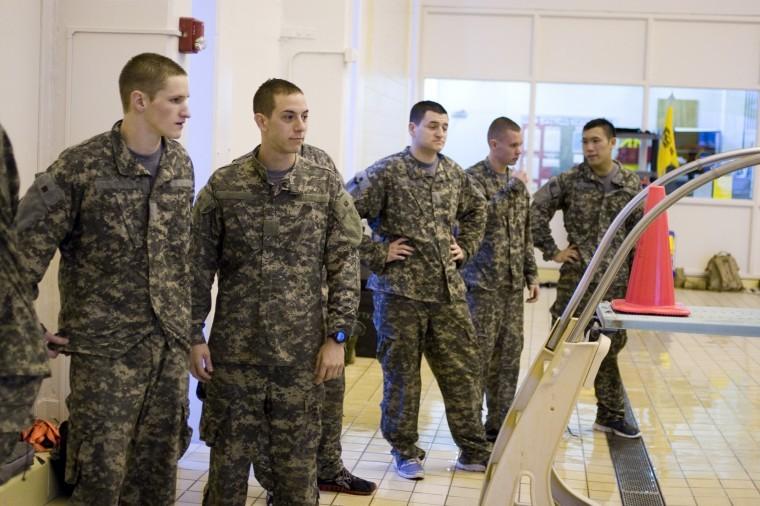ROTC teaches basics of underwater combat
December 2, 2012
Shayne Hayes felt nervous as he plunged into the pool.
The freshman ROTC cadet was about to participate in his first water combat test. He had to complete the 15-meter rifle swim event, where he was required to swim across the pool with his equipment and rifle.
“It was a little nerve-racking in the beginning,” Hayes said. “I had never swam with that much stuff, nonetheless a rifle.”
The NIU Army Reserve Officers’ Training Corps cadets gathered by the Anderson Hall pool for the combat water survival test on Thursday. The test was meant to evaluate the cadets’ ability to handle combat situations underwater. The test consisted of three events: the 15-meter rifle swim, the equipment drop and the unexpected entry event. Each event was specifically designed to simulate underwater combat.
Cadet Edward Tolle, senior military science major, said the 15-meter rifle swim event teaches cadets how to get out of the water while at the same time allowing them to use their weapons.
“If you find yourself in water, it’s important to keep your rifle working,” Tolle said. “If it gets too wet, you’ve ruined it.”
The second event was the equipment drop. Cadets had to remove all their equipment after being submerged.
“They need to avoid getting dragged down,” Tolle said. “They need to get out and get up.”
The last event was the unexpected entry test. Cadets climbed up the diving board and were blindfolded. The cadets then either jumped into the pool or were pushed into the pool unexpectedly. The cadets had to maintain their composure and hold on to their rifle while they fell into the pool.
“The main objective of the unexpected entry is to teach the cadets to have no unusual fear or panic,” said Cadet Lt. Col. David Cutsinger. “You never know when you could end up in water. You’re going to need to know how to survive.”
When Hayes completed the 15-meter rifle swim, he said he felt more confident.
“I had to suck it up and be a man,” Hayes said. “You never know what you’re going to be thrown into until you’re in the middle of it.”
Lt. Col. David Dosier, military science professor, said the events for the combat water survival test were important because cadets may not know what environment they could get themselves into during combat.
“Anything could happen,” Dosier said. “It’s very important to know water survival when you’re out there.”







